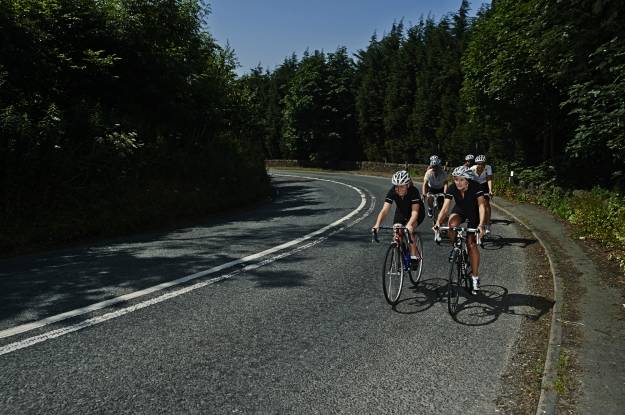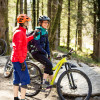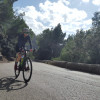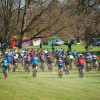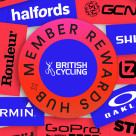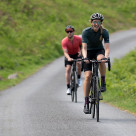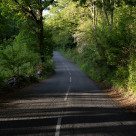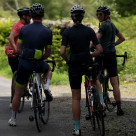If you’ve got an overseas event, here are our tips for arriving fresh, relaxed and ready to ride.
Insurance and race license
Make sure you have the correct documentation for your event and, if anything should happen to you or your bike, adequate insurance. It is always better to spend some extra time before you go double checking these things than subjecting yourself to stress and the possibility of not being able to ride.
Also read 'Essential information before racing and riding abroad'.
Bike
Flying with a bike can be stressful but, if well packed, it should stand up to any abuse from baggage handlers. Although hard cases are heavier, bulkier and more expensive than soft cases, there is no doubt that they offer more protection and peace of mind. Look for models with an anti-crush pole as this can make all the difference if your box finds itself at the bottom of a pile of luggage. There are now a number of companies that rent out high quality bike boxes if you don’t travel enough to warrant buying one. Check out our top 10 tips on flying with your bike here.
Kit and clothing
Don’t be tempted to fill your bike box with additional kit and clothing without checking your airline’s regulations. Some don’t allow any additional content, many impose fairly stringent weight limits (23 kg) but a few allow up to 32 kg.
If your luggage does go astray, most kit and clothing can be borrowed, rented or replaced fairly easily. However, shoes and pedals can be difficult to get hold of and set-up properly so, put these in your hand luggage.
Time shift
Change your watch to local time at your destination as soon as you get on the plane. If you are travelling to a significantly different time zone, consider gradually adjusting your sleep times towards your destination a few days ahead of travelling.
Hydrate
The cabin on a plane is an incredibly drying environment and, with limited water available, it is easy to become dehydrated on a flight. This can leave you feeling groggy when you arrive and having to play hydration catch up prior to your event. Put a couple of empty water bottles in your hand luggage and fill these once you are through security to sip on the flight, aiming for about 200 ml per hour. Consider adding electrolyte tabs for flavour and valuable salts.
Alcohol
Although there’s always a holiday feel to travelling abroad, if you’re heading to an event that you’ve put in a lot of training for and want to perform at your best, avoid drinking alcohol at the airport or on the plane. It will undoubtedly make you feel worse when you arrive and can contribute to dehydration. Save your celebratory drinks for after you have completed your event.
Food
The food available on flights, especially short haul, can be limited, expensive and unhealthy. Taking your own food, as long as it is wrapped or in a sealable container, ensures you get the right food so close to your event. Sandwiches, wraps and salads are great options but be wary of ingredients that need chilling as gel packs do fall under the restrictions for carrying liquids or gels on flights. Energy bars, fruit, fresh and dried, make good snacking options. If you have an early morning flight, a porridge pot just requires some hot water from the flight attendant.
Flight clothing
On the whole, clothing should be loose and comfortable. Don’t forget a warm top as it can get chilly during a flight. For longer flights, compression socks or stockings can reduce the risk of thrombosis and stop your legs feeling so heavy on landing.
Ear plugs and eye mask
Can make all the difference to getting some sleep on the plane and, if you are going to be sharing a room, can also be a sleep-saver once you have arrived.
Entertainment
Although it can be tempting to binge on the latest releases, if you are on an overnight flight, need to adjust to a new time zone and should be sleeping, limit yourself to just one and avoid anything too action packed, stimulating or upsetting. Download some podcasts or audiobooks that you can drift off to.
Move
Hopefully you will be so well hydrated that staying in your seat won’t be an option. During long haul flights, get up and walk around the cabin regularly. Also, when you are sat down, contract and relax your leg muscles to stimulate blood flow.
Unpack
No matter the time or how tired you are, get your bike unpacked and built up. It won’t be a long job and means, if anything has got damaged in transit, you will have the maximum amount of time available to get it sorted.
Exercise
Some light exercise on arrival can definitely help to get the flight out of your legs. You might not be able to get out on your bike but a short spin on an exercise bike in the hotel gym or even a brisk walk can be beneficial.
If you haven't got a 2019 cycling trip booked yet, remember British Cycling Members get a 10% discount with Love Velo Cycling Holidays.
For travel insurance, British Cycling Members can save 10% with Bikmo Travel insurance.




